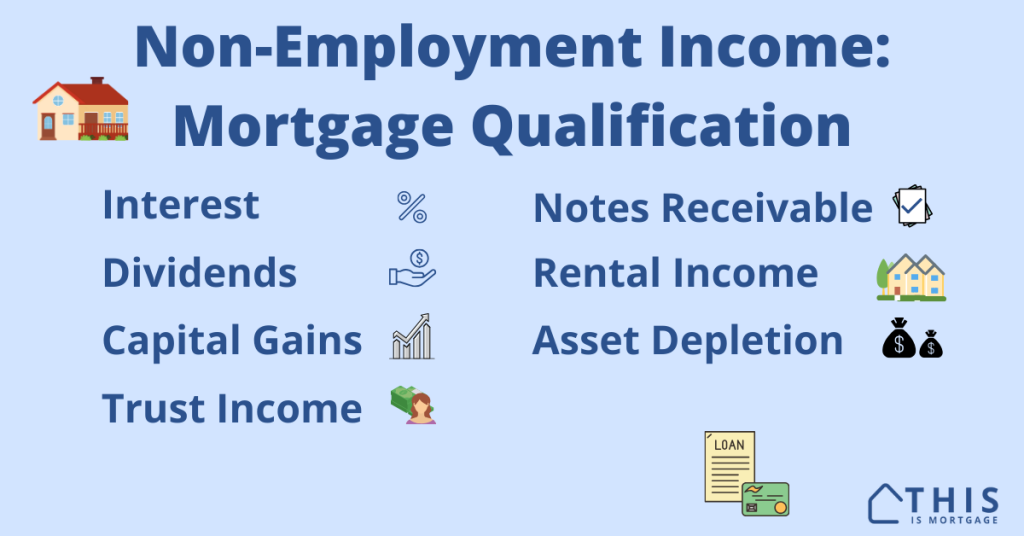If you have significant investments or passive income, you may be able to use it to qualify for a mortgage.
You can even use multiple income types along with employment income.
Following is how lenders review various non-employment income types and the typical documentation needed.
See if your income type qualifies you for a mortgage.
Interest & dividend income
If you have a significant amount invested, you may receive consistent interest and dividend income each year.
FIRE community members leverage this income type.
The lender will use the two-year earnings average based on the most recent two years of tax returns.
Using interest and dividend income can get tricky if you plan to remove some of the capital for the down payment. The lender will reduce qualifying income to match the remaining balance.
For example, you have a two-year average of $50,000 per year on a $1 million investment account (5% annually). You plan to use $100,000 for the down payment. The lender will reduce annual qualifying income to $45,000 ($900,000 X 5%).
Documentation
- Two years of tax returns or the last two year-end statements for investment accounts
- Current investment statements showing balances
See if interest and dividend income can help you buy a home.
Capital Gains
Day traders and full-time investors (stocks, bonds, real estate, etc.) can use ongoing capital gains to qualify.
Show two years of history (three years for FHA) from filed tax returns.
The lender may verify that you currently own additional assets with which to generate income in the current year.
Keep in mind that capital losses will be counted against you. Make sure you show positive income before attempting to use this income.
If income declined in the most recent year, the lender will use the most recent 12-month average.
One-time capital gains from selling a house, for instance, may not be used as qualifying income.
Documentation
- Two years of tax returns (three for FHA)
- Evidence of adequate current assets to support continued income
Trust income
Trust income can come in the form of a pre-determined fixed amount or from interest earnings on trust assets.
Fixed payments generally do not require a two-year history on tax returns. So a new fixed trust payment can be used to qualify immediately.
If the trust income varies each year or there’s no fixed payment, the lender must average income based on two years’ tax returns. In this case, newly-received trust income can’t be used.
If income is based on a depleting asset, the lender will verify that the income is likely to continue at least three years. The lender will also reduce qualifying income if trust funds are used for the down payment.
Documentation
- Trust document
- If variable trust income, two years’ tax returns
- Current bank statement showing receipt of trust income
Get help analyzing your income.
Notes receivable
The underlying loan for notes receivable income must last three years.
For example, the lender would disregard income from a five-year loan that originated three years ago. Only two years remain on the note.
You must have been receiving payments for at least 12 months. Income from notes less than a year old will not be considered.
Notes receivable income that fluctuates can be used, but the lender will use the most recent one-year average.
Documentation
- A copy of the signed note
- At least one year of tax returns or canceled checks showing consistent payments
See if your notes receivable income helps you qualify.
Rental income
Perhaps the most common passive income, rental income, may be used to qualify.
Typically, the lender will want to see a two-year history of rental income on tax returns. Rental income and expenses will be factored into debt-to-income ratios. Properties showing a net loss will count against your income.
In some cases, you can document income from a newly-rented property with lease agreements and a fair market rent report from an appraiser.
For conventional loans, you may not use rental income to qualify if you are currently living rent-free.
To use future rental income from the property you’re buying, see:
Documentation
- Two years’ tax returns
- Lease agreements
- Fair market rent reports
- Closing documents for properties placed into service in the past year
Asset depletion
In some cases, borrowers 62 and older may use “asset depletion” to qualify for the mortgage.
This is when the lender takes the amount of assets, removes potential penalties and down payment amounts, and divides by the loan term in months (360 for a 30-year loan).
For example, a net $500,000 asset after penalties and down payment would yield $1,388 per month ($500,000 / 360).
The borrower must put down 20-30% and other restrictions apply, so speak to a lender to see if this is an option for you.
If conventional isn’t an option, find a “non-QM” lender that offers alternative lending.
Many types of income can help you buy a home
Dozens of non-employment income types can help you qualify. Get a personalized income review from a knowledgeable lender to see if your income is eligible.




